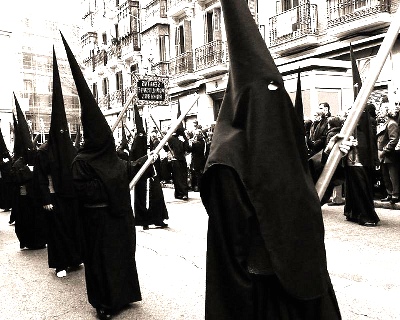The Israeli-born son of a Holocaust survivor told a newspaper he wasn’t Jewish by religious law – and had access to state services temporarily frozen, and his nationality put under review. But this is no isolated incident: Religion plays an increasingly dominant role in the mechanisms of the state.
Haaretz today reports of yet another way to fall between the cracks of the hopelessly politicized “who’s a Jew” question: Making a careless comment to a newspaper. A kibbutznik by the name of Itay Bar gave an interview to the Haaretz Family Affair section last Friday, and made a fatal mistake.
[Bar told the newspaper that his] father, a Catholic, arrived at the kibbutz as a volunteer after the Six-Day War, where he met Bar’s mother, the daughter of a Catholic mother and a Holocaust survivor father. Bar was born in Shoval and Hebrew is his native language. He mentioned in the interview that he is mistakenly described as Jewish in his ID card, but still serves as a “Shabbes goy” at the kibbutz dairy.
You’d think that children of Holocaust survivors would be immune to ethno-cultural profiling by state officials; not only because it’s generally nasty and carries the faint whiff of a déjà vu (or rather, bereits gesehen), but also because Israel was ostensibly created to provide a safe haven for all those who would be persecuted for their Jewishness, and it’s only reasonable to assume such people wouldn’t be asked to leave their children behind.
Someone at the Interior Ministry thought otherwise:
Three days ago, Bar arrived at the population registrar office in Be’er Sheva to obtain a document he needed. To his surprise, the clerk there told him his case was “blocked.” He said that there was an alert about my nationality, following a report. I asked who reported it, and she said she couldn’t tell me, but it might have something to do with the Haaretz article. From her I went to another clerk, who started asking me about my grandparents. I told her she was infringing upon my civil rights.”
Later on, Bar found himself arguing with the deputy director of the office about his Jewishness. “She asked me if I was Jewish, and I said yes, I was circumcised and I celebrate the Jewish holidays.”
The English translation omits the continuation of that dialogue:
She asked me if I went through with conversion and I said, I didn’t, but as far as I’m concerned, I’m Jewish.. she said that as far as she is concerned, I’m not, and asked me to sign a paper, apparently a request for changing my nationality. I refused.”
At the end of Bar’s long day at the ministry, it turned out that the “alert about Bar’s nationality” [sic] was initiated by an informer. He was told the report on him came through the ministry’s spokeswoman, Sabine Haddad; she denies the allegations, but it’s her word against theirs.
So what do we have here? On the gut level, the image of Interior Ministry snoops going through the press for hints about possible “blood disloyalty” is nauseating, while the exchange with the deputy-director is downright perverse: How dare she, a non-medical official, bring Bar to disclose whether or not he’s been circumcised? What business is of hers? And what business is it of the state which holidays you celebrate and which religious customs you observe?
But on the more dispassionate level, the story should be taken as yet another symptom of a trend. Much like the theist alterations of the IDF memorial prayer (charging God instead of the People of Israel with remembering falling soldiers), this signals yet again of how Israeli state nationalism is gradually becoming a matter of religion.
Separation of state and church, of course, doesn’t insure us from racism and atrocities, and Israel’s good old secular nationalism was nothing to write home about – it was the bold secular labor-Zionist center-left Leon-Uris-style Sabras who perpetrated the Nakba, of course. Suffusion of state power and religion, however, is forever bad news, both for the state and for the faith. Classical racism plays an important role, and is inseparable from such religionization: Bar was singled out for his origins, not for his behavior.
But faith is an even more powerful factor in both the symptom and the trend. Do you believe in God, do you celebrate his holidays, did you submit yourself to the two years process of studying/indoctrination, once you learned your origins were impure? Do you believe? How can we know that you believe? There’s something about seeing religious faith seeping ever deeper into the organizing principles of a state’s bureaucracy that makes the idea of a thought police hover uncomfortably close.


